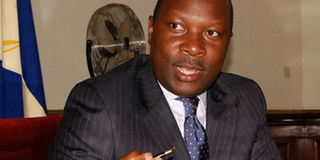Federalism will help out Uganda as failed State – Makubuya

Third Deputy Prime Minister and constitutional affairs Minister of Buganda Kingdom, Apollo Makubuya. Photo by James Kabengwa
What you need to know:
- Govt. "We have not received any federal requests from Mengo,” Gen. Kahinda Otafiire says.
- Makubuya: There is need to work on building and strengthening institutions and remove the tendencies of personal rule.
- Few individuals cannot and should not impose their will or their vision and rule on people against consent
KAMPALA. A senior member of Buganda kingdom Cabinet has said that Ugandans are polarised and as such, according to him, there is paralysis in the functioning of the central government.
Mr Apollo Makubuya, the kingdom deputy premier and constitutional minister, in an interview with this newspaper on Thursday, proposed that the country urgently adopt federalism as a panacea to pull it back from being a “failed state”.
“Few individuals cannot and should not impose their will or their vision and rule on people against consent,” he said, adding, “I believe that the people of Buganda and generally Uganda wish to benefit from federal. But also those not wanting it can remain in the unitary system.”
The central government Justice Minister Kahinda Otafire in a rejoinder, however, said Mengo was yet to renew formal request for revival of a federal system of government where parts of the country would operate as semi-autonomous units in running their affairs.
“We have not received any federo request from Mengo,” Gen Otafiire said.
A Mengo proposal for federo previously received popular support, and most pronounced within the kingdom, during the constitutional review process.
As such, the kingdom officials questioned why it was never implemented.
The central government instead adopted a regional tier system under which districts would cooperate on willing basis to pursue common development agenda. This too remained on paper.
In the Thursday interview, Mr Makubuya argued that federo would empower ordinary citizens to exercise real power on who governs them and how as envisaged under Article 1 of the Constitution.
“What we see today, he said, “is people forcing self-ambitions regardless of the popular demands and this has polarised the country. Everyone looks at the other as an enemy. People are playing zero sum politics.”
“We should be able to listen to each other. In other multi party democracies, politics is not all about fights or hate.”
The Buganda kingdom minister cited what he called “broken health care and education services, the struggling economy, non-democratic tendencies and rampant strikes by civil servants” show that Uganda is a “failed state”.
“There is a degree; some kind of paralysis. On [the] one hand the ruling party and the ruling class and [on the other] the people on the opposition. Many issues are bi-partisan; there must be issues intended to promote rule of law, national interests and democracy,” Mr Makubuya said.
The kingdom official’s strong comments on diverse national issues almost coincided with President Museveni’s separate renewal of a warning for cultural leaders to keep off politics.
“Cultural institution should not interfere into politics because we already have a lot of politicians. We don’t need additional politicians through culture,” the President said while presiding over a cultural festival in the northern Gulu District.
Mr Museveni said his government restored traditional and cultural institutions in 1993 for them to promote and preserve indigenous cultures “and not to pave way for political mobilisation”.
In the Thursday interview, Mr Makubuya had said that there is need to work on building and strengthening institutions and remove the tendencies of personal rule because democracy must anchor on the will of the majority.
“I don’t believe because we have a constitution, regular elections, the parliament, judiciary and those arms of government that we have democracy. They must function independently. [Only] then we say we are a democratic, peaceful and stable nation,” he said.
Buganda kingdom has since colonial days had showdowns with the central government and a power contest in 1966 resulted Milton Obote abolishing all kingdoms and traditional kingdoms until when they were restored 24 years ago.
Relations between Mengo and the central government have generally thawed from the lows of the 2009 bloody pro-Buganda riots sparked byr the government’s refusal for the Kabaka to visit Kayunga.




